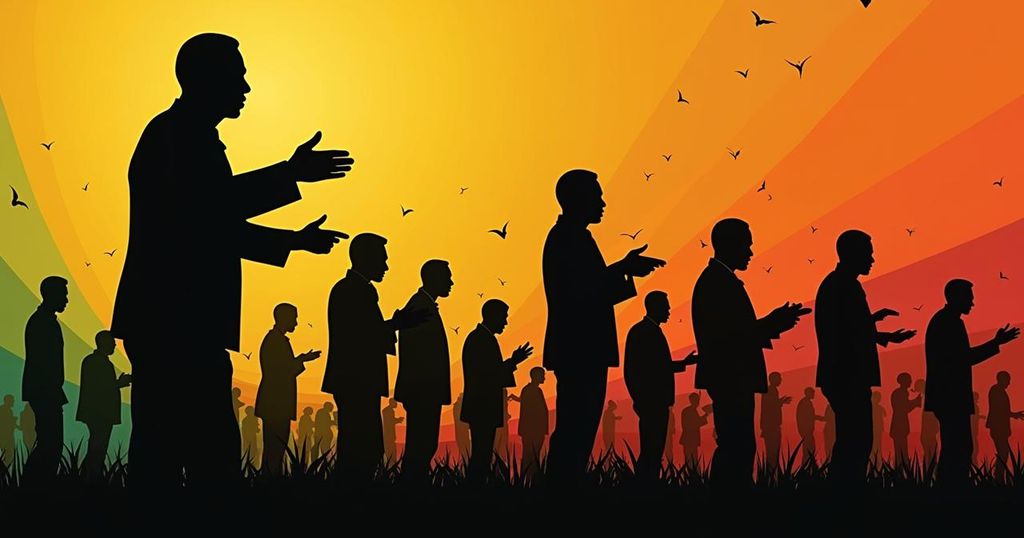Mozambique’s Elections: A Pivotal Moment for Democracy and Governance
Mozambique is poised to vote for a new president, potentially extending the ruling Frelimo party’s 49-year tenure since independence in 1975. Daniel Chapo is the candidate for Frelimo, while independent Venancio Mondlane emerges as notable opposition. The elections will also determine parliamentary and provincial governance structures, amid allegations of past electoral fraud and ongoing instability due to conflict and economic strife.
Mozambique is set to conduct presidential elections on Wednesday, a pivotal moment that may prolong the ruling party’s dominance for 49 years since the nation achieved independence from Portugal in 1975. The ruling Front for the Liberation of Mozambique (Frelimo) has nominated Daniel Chapo, a 47-year-old former radio and television presenter, to succeed President Filipe Nyusi, who has reached the constitutional limit of two terms. Chapo’s primary opposition comes from independent candidate Venancio Mondlane, 50, who has emerged as a significant challenger, particularly among young voters disillusioned by high levels of poverty and unemployment. In addition to selecting a president, voters will also determine the composition of Parliament and elect provincial governors in a country of approximately 33 million people, which has endured a devastating 15-year civil war that concluded in 1992. Both leading candidates have promised to address the ongoing jihadist insurgency in the Cabo Delgado province that has displaced over 1.3 million individuals. The electoral process, consisting of one-day voting, will begin with vote counting immediately after the polls close. Preliminary results are anticipated the following day, with complete results required to be submitted to the Constitutional Council within 15 days for validation. Approximately 17 million citizens are registered to participate in this electoral process. The integrity of the upcoming elections is under intense scrutiny, particularly as Frelimo has faced allegations of electoral manipulation in prior contests, most notably in last year’s local elections where it reportedly won in 64 out of 65 municipalities. Despite these accusations, Frelimo maintains its innocence, while international observers from bodies such as the European Union are monitoring the electoral proceedings. Frelimo’s historical context includes establishing a one-party state post-independence and its enduring conflict with the Mozambique National Resistance (Renamo). With Renamo slated to participate in this election under the leadership of Ossufo Momade, who has been involved in the peace process following a fragile truce in 2019, the political landscape remains charged. Meanwhile, Mondlane’s campaign represents a departure from traditional alignments, focusing on coalition-building and addressing socio-economic grievances, garnering support from the newly formed Podemos party. Analysts reveal that while Mondlane has introduced a renewed sense of hope, the prevailing expectation leans towards Frelimo retaining control, noting its overwhelming success in the previous elections. Pangea risk company has characterized Chapo’s candidacy as a strategically orchestrated endeavor by Frelimo. Should Chapo succeed, he would become the first leader born after Mozambique’s independence.
Mozambique has a long and turbulent political history, marked by a civil war and significant changes in governance since gaining independence from Portugal in 1975. The Frelimo party has dominated the political landscape since its inception, having established a one-party state in the aftermath of independence. It faced formidable opposition from Renamo, and the civil conflict lasted until a peace agreement was reached in 1992. In recent years, ongoing issues such as electoral integrity and socio-economic challenges, including poverty and violence in the north, have complicated the political scene, prompting independent candidates like Venancio Mondlane to rise. The upcoming elections is thus a critical juncture for Mozambique, as it could either reinforce Frelimo’s long-standing rule or signal a shift towards more diverse political representation.
In summary, the forthcoming presidential elections in Mozambique are critical, not only due to the potential for extending Frelimo’s nearly five-decade rule but also as a determinant of the country’s path forward amidst ongoing challenges. Daniel Chapo aims to continue the ruling party’s legacy, while independent candidate Venancio Mondlane seeks to capitalize on the public’s desire for change, particularly among the youth. The outcome will be closely watched, both locally and internationally, given the broader implications for governance, stability, and the ongoing socio-economic challenges facing the nation.
Original Source: apnews.com




Post Comment